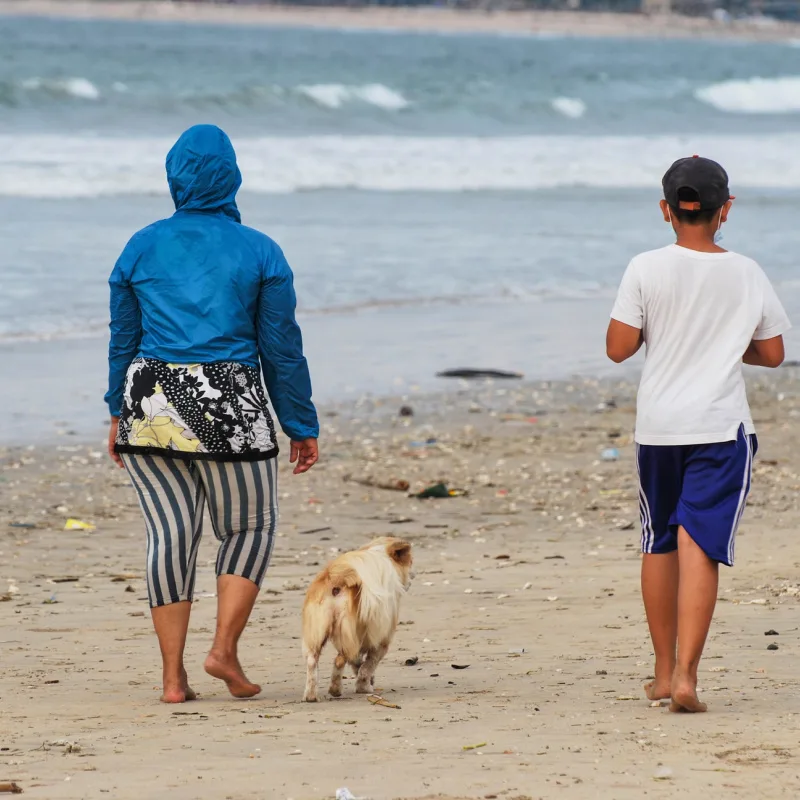Health officials in Bali have been responding to a high number of rabies cases on the island for the past year.
Bali has confirmed that four people have died while testing positive for rabies following dog bites.

The number of rabies-transmitting animal bites in Bali is high, but leaders say it is still under control. As of August 2024, there are 34,809 bite cases recorded in Bali Province, with 263 positive rabies cases and four deaths.
Details of the province-wide rabies situation were explained by the Secretary of the Bali Province Regional Coordination Team for the Prevention and Control of New Infectious Diseases (PIB) Zoonosis, I Made Rentin, at the Bali Province BPBD Office in Denpasar during a press conference this week.
Rentin explained that compared to 2023 and the years previous, there has been a light decline in the number of reported rabies cases.
In 2023, there were 72,782 possible rabies transmission animal bite cases with positive rabies testing in people, reaching 635 and 9 deaths.
In 2023, the highest rates of dog bites were recorded in Tabanan Regency and Karangasem Regency.
Rentin explained that one of the big issues the department is facing is public awareness of animal bites and the risk of rabies.
He said that in 2024 the distribution of bite cases is fairly even throughout Bali’s regencies. Rentin shared his concerns for the future: “The challenge of controlling rabies in the coming years will be increasingly difficult because of the (constraints) of vaccine availability and the increasing operational costs of control upstream.”
The Bali Provincial Government funds a mass vaccination program for pets, community-owned dogs, and stray dogs to help reduce the transmission of the virus among the dog population.
There are also similar programs in place at tourist attractions where wild and human-habituated monkeys are present.
Speaking from Karangasem Regency, the Head of Agriculture, Food and Fisheries (Distan PP) Karangasem Regency, I Nyoman Siki Ngurah, said that 1,600 bite cases had been reported so far this year, with fifty cases subsequently testing positive for rabies.
He confirmed that of the known 81,000 dogs in Karangasem regency, 70% have been vaccinated against the virus.
Ngurah said, “Our vaccinations are done regularly and scheduled for the villages. We are trying to get 100 percent vaccinated dogs.”
He praised the public for responsible dog ownership in Karangasem Regency and for those who have played their part in spreading awareness of the condition.

Tourists must be aware of the rabies-transmitting animal bite protocol before traveling to regions like Bali, where the virus is widespread.
Rabies spreads between infected animals and humans via salvia. This is usually through bites and scratches, essentially by exposing a wound to infected saliva.
According to the World Health Organisation, “Dog bites and scratches cause 99% of the human rabies cases, and can be prevented through dog vaccination and bite prevention.”
Tourists must be aware that once clinical symptoms of rabies appear in an infected person, this means the virus has reached the central nervous system and is 100% fatal.

However, as described by the World Health Organisation, “rabies deaths are preventable with prompt post-exposure prophylaxis (PEP) by stopping the virus from reaching the central nervous system. PEP consists of thorough wound washing, administration of a course of human rabies vaccine, and when indicated, rabies immunoglobulins (RIG).”
Prevention is the best form of protection for both humans and dogs against rabies. The World Health Organisation also states, “Vaccinating dogs, including puppies, through mass dog vaccination programs is the most cost-effective strategy for preventing rabies in people because it stops the transmission at its source. Culling free-roaming dogs is not effective in controlling rabies.”

Tourists who have been bitten, scratched, or otherwise exposed to a potentially rabies-carrying animal should seek immediate medical attention.
Hospitals and local health clinics in Bali are experienced in dealing with rabies exposure and can offer tourists immediate support.
Remove All Ads & Unlock All Articles… Sign up for The Bali Sun Premium

Plan Your Bali Holiday:
Book The Best English Speaking Drivers For Airport Transfers & Tours
Choose From Thousands of Bali Hotels, Resorts, and Hostels with Free Cancellation On Most Properties
Book Cheap Flights To Bali
Don’t Forget Travel Insurance That Covers Medical Expenses In Bali
For the latest Bali News & Debate Join our Facebook Community
SUBSCRIBE TO NEW POSTS
Enter your email address to subscribe to The Bali Sun’s latest breaking news, straight to your inbox.
Discover more from The Bali Sun
Subscribe to get the latest posts sent to your email.

J West
Sunday 1st of September 2024
Bites from beach dogs usually leave the country to be treated by Australian or other foreign hospitals. Wild beach dogs with rabies have always been a big problem....but since tourists don't realize they're infected until they return home the irresponsible Balinese government pretends there's no problem.
Paul
Friday 4th of October 2024
@J West, It seems to me that it is the tourists that are irresponsible. Before visiting any country, tourists should research any possible problems they might encounter.
Shorty
Tuesday 3rd of September 2024
@J West,
Most will seek and get the initial shot here. With the time interval between shots of course many will get the follow up ones in their home country.
Steve b
Sunday 1st of September 2024
Rabies have been here forever and same with rabies deaths. Exterminate cull kill all dogs without a collar on all roads in bali at night.dogs are veiwed localy as bad humans reincarnated into dogs so no one cares, clean up the villages and all bali and stop dogs entering at ports
LightsabarLuke
Sunday 1st of September 2024
The ultimate solution is a mass sterilisation program, but the Balinese government hasn't seemed to figure that out yet....
Firechef
Sunday 1st of September 2024
Issue all police tranquilizer guns and shoot those strays on sight Then take them to a Vet and have them either checked and vaccinated or euthanized. That should solve the problem. But of course that will never happen, it's too simple.
Paul
Tuesday 3rd of September 2024
@Firechef, great idea, but like you say it won't happen!they could also have special incident numbers and emails so they can subsequently inform the banjars of packs roaming around. These then should take action accordingly.
WAYAN BO
Sunday 1st of September 2024
All good peoples like dogs.